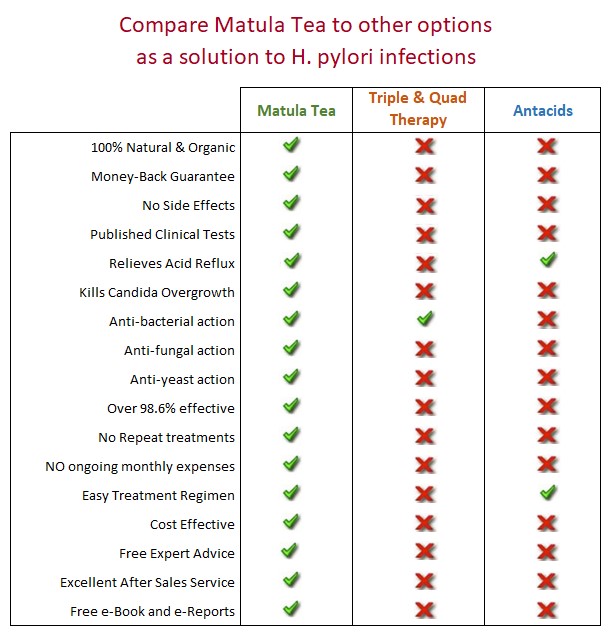Discover how to Get Rid of H. pylori Bacteria Naturally
Exploring Natural Remedies
Finding out how to get rid of H. pylori starts with looking at effective treatment options. The first key point to understand is that not all treatments are equally effective.
Exploring natural remedies for H. pylori is increasingly valuable, especially as antibiotic resistance rises. Antibiotic therapies, such as Triple Therapy, were effective a few years ago but now have high failure rates due to resistant H. pylori strains, leading to persistent infections and recurring symptoms.
Natural treatments, like Matula Tea, offer an alternative, focusing on antibacterial properties without contributing to resistance. Matula Tea not only clears H. pylori infections, but also promotes gut health and has none of the harsh side effects associated with antibiotic treatments like Triple Therapy and Quad Therapy. With limited treatment options available to doctors, natural approaches provide a solution to support effective and sustainable H. pylori management.
Benefits of Matula Tea – the only treatment that is guaranteed to work
Matula Tea is a widely recognized natural remedy for clearing H. pylori infections, praised for its gentle yet highly effective action. This herbal tea is celebrated for its antibacterial, antifungal, and anti-parasitic properties, making it a comprehensive solution for gut health. Significant improvements in symptoms like gastritis and ulcers are typically felt within a few weeks of use.
Matula Tea is distinctively 100% natural, containing no synthetic additives, which minimizes the risk of side effects often associated with pharmaceutical treatments. This remedy is easy to incorporate into daily routines, requiring just two cups a day, with a mild, enjoyable flavor that suits most palates.
A standout feature of Matula Tea is its one-time treatment approach, offering simplicity and convenience. With over 55,000 success stories, a remarkable success rate of over 98%, and a money-back guarantee if it doesn’t clear the infection, Matula Tea provides a reliable and reassuring alternative to conventional treatments.
If you are looking for a natural, effective solution to H. pylori without the risks of failure or harsh medications, Matula Tea remains an increasingly popular choice.

Other Popular Herbal ‘Treatments’ and Foods
The majority of herbal treatments and foods promoted as natural remedies for H. pylori, may offer some relief or even reduce infection levels slightly. The problem is that there is insufficient evidence to prove that they are effective with clearing infection when used either as a standalone treatment, or when combined with other options.
Garlic & Broccoli sprouts: These options are both known for their antibacterial properties. Garlic contains allicin, an active compound that may inhibit H. pylori growth, but this is not enough to clear an infection. Meanwhile, broccoli sprouts are rich in sulforaphane, which has been shown to target and reduce H. pylori bacteria. But dosages and overall effectiveness are not clear, so we recommend that both garlic and broccoli sprouts rather be used as supplements alongside other more effective treatments.
Manuka honey: Recognized for its antimicrobial properties, it can be considered as a soothing and effective adjunct treatment. It can be consumed directly or added to herbal teas for a comforting remedy.
Turmeric: This is another culinary herb with antimicrobial and anti-inflammatory benefits, often used to support digestive health, as it may slow the growth of an h. pylori infection if you get the dosage right. It won’t clear an h. pylori infection if used as a standalone treatment.
Mastic Gum: Popular for treating some digestive issues. Some claim that it inhibits the growth of H. pylori and reduces inflammation in the stomach lining but we have not found any evidence to support this. Some people find it helpful as part of a broader treatment approach for mild infections. NOTE! Mastic Gum should not be used when taking Matula Tea.
Incorporating these herbs and foods into a balanced diet can enhance your H. pylori treatment with Matula Tea. However, Matula Tea is guaranteed to work without any additional supplements for dietary changes, and if you choose to add these we recommend that you discuss any dietary changes with your healthcare provider first.

Why Choose Matula Tea Today?
Take Action Now:
- Maximize Your Time and Money: Don’t waste valuable resources, or risk your health with ineffective solutions. Matula Tea is lauded by over 55,000 happy customers for its effectiveness and ease of use, providing a simple path to better digestive health.
- Guaranteed Results plus Peace of Mind
Matula Tea is guaranteed to clear H. pylori infections with just one 30-day treatment. If it doesn’t work as promised we don’t want it to cost you anything. Click Here to learn more - Embrace Nature’s Power: With its 100% natural ingredients, Matula Tea harnesses the power of herbs to help restore your stomach’s equilibrium, gently and effectively with no harsh side effects.
- Easy Integration: Enjoy the benefits with just two cups a day, seamlessly fitting into your daily routine.
Whether you’re dealing with antibiotic resistance or prefer a holistic approach, Matula Tea offers a trusted alternative. Begin your journey to digestive wellness today and experience the difference that Matula Tea can make for your health!



OR…
References
- Chey, W.D., & Wong, B.C. (2007). American College of Gastroenterology guidelines on the management of Helicobacter pylori infection. The American Journal of Gastroenterology, 102(8), 1808-1825. Retrieved from https://www.ncbi.nlm.nih.gov/pubmed/17608775
- Malfertheiner, P., et al. (2017). Management of Helicobacter pylori infection—the Maastricht V/Florence Consensus Report. Gut, 66(1), 6-30. Retrieved from https://gut.bmj.com/content/66/1/6
- Fischbach, L.A., & Evans, E.L. (2007). Meta-analysis: the efficacy, adverse events, and adherence related to first-line anti-Helicobacter pylori quadruple therapies. Journal of Medical Microbiology, 56(2), 146–156. Retrieved from https://jmm.microbiologyresearch.org/content/journal/jmm/10.1099/jmm.0.46920-0
- Van Zanten, S.J. et al. (2003). The role of genetic polymorphisms in Helicobacter pylori infection outcomes. American Journal of Gastroenterology, 98(9), 1912-1921. Retrieved from https://journals.lww.com/ajg/Fulltext/2003/09000/The_Role_of_Genetic_Polymorphisms_in_Helicobacter.18.aspx
- Healthline on H. pylori Treatments

